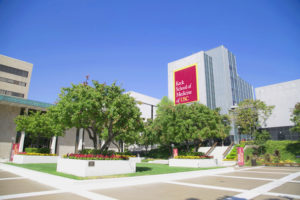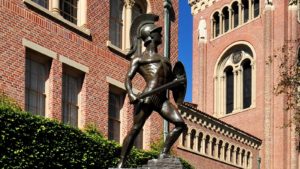DEI Programs and Resources at the Keck School of Medicine of USC and Children’s Hospital Los Angeles (CHLA)

The Bridging the Gaps Summer Research Program at the Keck School provides an opportunity to outstanding underrepresented students to gain meaningful exposure to the exceptional research and clinical programs. The program’s aim is to address the under-representation of minority students within medicine and the biological sciences. The ultimate goal is that the majority of these students will want to pursue their medical or graduate studies in the biological sciences at the Keck School.
The Center for Gender Equity in Medicine and Science (GEMS) at the Keck School aims to achieve a climate of gender equity and safety for all, working in close collaboration with diversity, equity, and inclusion (DEI) initiatives across the University and with an intersectional approach.
The CIRM Summer Program to Accelerate Regenerative Medicine Knowledge (SPARK) at USC-affiliated CHLA offers California high school students an invaluable opportunity to gain hands-on training in stem cell research at a leading research institutes in California. SPARK specifically selects students who represent the diversity of California’s population, particularly those who might not otherwise have opportunities to partake in research internships to due socioeconomic constraints.
Justice through Equity, Diversity, Inclusion, Well-being and Social Transformation (JEDI-WeST) at the Keck School is a group of faculty, staff and leaders that are interested in changing culture to make the school a more inclusive place.
The Office of Diversity and Inclusion at the Keck School aims to recruit, retain and increase the number of minority students and to provide counsel to minority medical students. The office recognizes the importance of diversity and supports all efforts to promote the richness of our cultures on campus. The goal is to graduate socially aware and culturally competent physicians prepared to practice in the global community.
The Summer Program in Diabetes and Obesity Research (SPIDOR) at the Keck School is a 10-week NIH/NIDDK funded summer research experience providing outstanding underrepresented students in science and medicine an opportunity to gain meaningful exposure to the exceptional research and clinical programs at the Keck School. Summer scholars conduct cutting-edge research in the laboratories of faculty members from the USC Diabetes and Obesity Research Institute (DORI) and are exposed to basic science, translational, and clinical research experiences.
USC+CHLA Alpha Clinic is part of a network of top California medical centers funded by the California Institute for Regenerative Medicine (CIRM) with the mission to expand existing capacities for delivering stem cell, gene therapies, and other advanced treatments to all patients, and educational opportunities to enhance the knowledge base of patients, their caretakers, and their families. The USC+CHLA Alpha Clinic is committed to engaging with local communities, promoting diversity in cell therapy trials, and ensuring that everyone has access to cutting-edge treatments and therapies.
DEI Programs and Resources at USC

Gender Equity Resources at USC provide gender-based resources for students to promote academic, professional, and social development, as well as present relevant social issues through an intersectional feminist lens.
The Diversity, Inclusion and Access (DIA) JumpStart Program at USC aims to increase the pool of diverse PhD applicants by providing academic and financial support and professional development opportunities. DIA JumpStart works with USC schools and programs to invite diverse candidates from outside institutions to apply for 10-week summer research opportunities in various PhD disciplines. Available opportunities range from lab-based research to mentored participation in other types of faculty projects.
Justice, Equity, Diversity and Inclusion (JEDI) Workshops at USC are peer-facilitated and focus on various topics, including identity, microaggressions, race, gener identity, sexuality and economic justice.
USC Kortschak Center for Learning and Creativity (KCLC) applies and engages in research and training to serve individuals with diverse learning needs and to empower students to reach their full academic and creative potential. KCLC offers outreach, programming, and individual coaching services to USC undergraduates and departments to promote a campus-wide understanding of learning differences and their potential to facilitate creativity and academic excellence.
The Office for Equity, Equal Opportunity, and Title IX (EEO-TIX) at USC centralizes resources for civil rights education, reporting, and resolution procedures.
The Office of Religious and Spiritual Life at USC sponsors campus programs with a moral, religious or spiritual focus and offers a variety of opportunities for exploring the spiritual dimensions of life and learning.
Office of Student Accessibility Services (OSAS) at USC ensures equal access for students with disabilities in compliance with state and federal law. OSAS serves undergraduate, graduate and professional students; on-ground and online students; and students in all credit-granting courses and programs of study.
The USC Culture Journey is a university-wide initiative to explore our values, align the supportive behaviors that bring those values to life and develop opportunities to improve our systems and processes.
USC Race and Equity Center is a dynamic research and organizational improvement center that works with professionals in educational institutions, corporations, medicine, and other contexts to strategically develop and achieve equity goals, infuse more equitable practices into the ways in which they engage with others, avoid and recover from racial crises, and cultivate sustainable cultures of inclusion and respect. The mission of the USC Race and Equity Center is to illuminate, disrupt, and dismantle racism in all its forms. This is done through rigorous interdisciplinary research, high-quality professional learning experiences, the production and wide dissemination of useful tools, trustworthy consultations and strategy advising, and substantive partnerships.
USC Student Equity and Inclusion Programs (SEIP) are a cluster of student development centers and initiatives within Student Affairs that offer student support services and programs that focus on intersectionality, sense of belonging and wellbeing. SEIP facilitates dialogue and community-building, and leads campus-wide equity and inclusion research and development initiatives to transform the student experience. SEIP consists of these departments:
- Asian Pacific American Student Services (APASS) provides programs, services and resources for students who identify as Asian, Pacific Islander and Desi American (APIDA) and educational opportunities for the entire campus.
- The Center for Black Cultural and Student Affairs (CBCSA) aims to create an Afrocentric, holistic learning environment for academic, social and professional development, and civic engagement for all members of the University community.
- The Cultural-affirming Lounges at USC provide students with a community building space that promotes Native American, Pasifika, Middle Eastern and North African identities.
- The First Generation Plus Success Center (FG+SC) serves as a resource hub for current first-generation, undocumented, transfer, and former foster youth students as they navigate campus. Our mission is to foster a sense of belonging and a culture of holistic well-being through intentional mentorship, supportive services and leadership opportunities. FG+SC encourages and empowers the USC community to embrace and celebrate the multiplicity of identities the first-generation college student population holds.
- The Latinx/Chicanx Center for Advocacy and Student Affairs (La CASA) provides empowerment through cultural identity, leadership and social consciousness development, as well as community building for undergraduate and graduate students at USC.
- The LGBTQ+ Student Center at USC is a cultural advocacy center that provides support, education, advocacy and community for undergraduate and graduate students at USC. The LGBTQ+ Student Center welcomes students from across the gender and sexual identity spectra and is dedicated to providing support and programming for all the intersectionality of identities within the university’s diverse community.
- Student Basic Needs fosters a culture of holistic well-being by helping to eliminate life barriers, such as food, housing, and economic injustice, that may jeopardize student academic and personal success. They support students by developing initiatives, streamlining communication with campus partners, and connecting students to campus and community resources.
- The Veterans Resource Center (VRC) enhances the individual and academic success of veterans, service members and their family members. The Veterans Resource Center is committed in supporting the veteran community in the areas of higher education, GI Bill benefits, academic success, graduation, well-being and career development.
USC Women in Management (WIM) empowers women employed at the University. WIM is composed of over 250 members, who are dynamic and progressive individuals, employed in diverse positions throughout the various departments, schools, and across all campuses of USC.
USC Women in Science and Engineering (WiSE) is a groundbreaking effort to increase the representation and success of women in science and engineering through a series of creative programs that enable women to thrive at every stage of their careers. Committed to developing fresh approaches to policies and to building a supportive environment for both women and men, the WiSE program is driving USC to the leading edge of diversity in science and engineering.